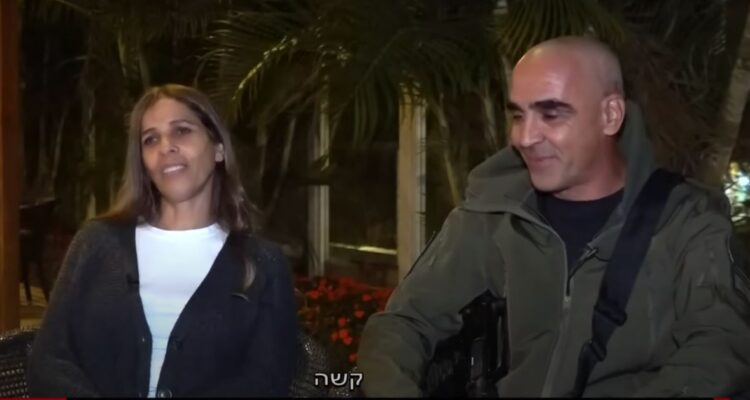Nasreen Yousef interrogated Hamas terrorists captured by her husband and provided life-saving information to IDF forces about the movements of other terrorists.
By Batya Jerenberg, World Israel News
A Druze woman saved the entire Jewish village she lived in during the Hamas invasion on October 7, 2023 due to her fast thinking, level-headedness and ability to speak perfect Arabic, Channel 12 reported last week in a heretofore unknown story of heroism.
The village of Yated is four kilometers both from the Gaza Strip and the Egyptian border. Iyyad Yousef, who has spent his entire life in the IDF and is currently a command sergeant major serving in Gaza, and his wife Nasreen, fell in love with the place when they came 15 years ago due to his army duties, and stayed, fully accepted as one of the community.
Despite having a broken leg in a cast, Iyyad rushed to join the emergency response team when the barrage of Hamas rockets turned into an invasion. The terrorists reached the Yousef home first, as it was on the edge of Yated closest to the border. The team overpowered two terrorists who were practically in their front yard – and then Nasreen went to work.
Determined to get information that could help her village as well as others that were being attacked, she started interrogating one of them in Arabic.
“Where did you get in from? Who sent you?” she asked, and “How many more of you are there?” He responded that there were “a lot” of them, and when she asked, “Where?” he told her that they were in the greenhouse.
This critical information was passed on to IDF forces, who captured 20 fighters and brought them all to the Yousefs’ yard. One of their phones then rang, and Nasreen found herself talking to their commander. Without missing a beat, she answered, told him that she was hiding his men, and asked him where they were all coming from and how many were coming, so she could know how much food and water she’d need for them as well.
Suspecting something, he asked to speak to one of his men. She approached the terrorist, she said, and offered him a deal.
“I told him, ‘Listen, I’ll give you money, food, gold. I’ll get you an IDF uniform and smuggle you out – but you have to tell [the commander] what I tell you to say.’ And he cooperated,” she said.
The commander told her the route his men were taking towards Yated, and an IDF force was rushed to the area and fought off 15 elite fighters from Hamas’ Nukhba force.
She managed to stay calm for many hours as bad news about terrorists killing friends elsewhere came in, but said she “broke” when she heard that a man who was like a brother to her had been murdered. She went outside to the bound prisoners, who were stripped to their underwear and had their heads covered, she said, “and found myself whipping them with a hose, cursing them and really going wild.”
Nasreen and her four children stayed in their safe room until the next morning, when Iyyad came to get them to safety, driving some 150 kilometers an hour through the fields in what was still a battle zone. She said she told the kids to stay down, not look around, and if bullets whizz by, to cover their heads with their hands and “try not to scream.”
The Yousefs were eventually brought to an Eilat hotel along with the rest of Yated’s residents. They have two rooms to sleep in, which are essentially just bedrooms, and it isn’t easy for any of them. When asked if she can sleep at night, Nasreen answered that she can only sleep by taking a pill, and it doesn’t always work. Sometimes she brings all the kids into bed with her because “that way I feel more secure,” she said.
But Nasreen understands the enormity of her accomplishment.
“If I hadn’t been there, I think, if I hadn’t gone outside and questioned them, it’s possible that our community, half of it, or the majority, would have died,” she said.





